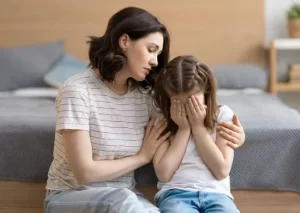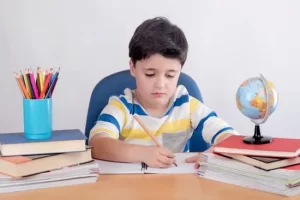The Power of Problem-Solving: An Essential Skill for Kids with Anxiety

 In our busy and always changing world, it’s very important to teach our kids the skills they need to handle life’s challenges. One of the best skills your child with anxiety can learn is problem-solving.
In our busy and always changing world, it’s very important to teach our kids the skills they need to handle life’s challenges. One of the best skills your child with anxiety can learn is problem-solving.
For kids, learning how to solve problems can boost their confidence and help them feel significantly better. They feel courageous and sure of themselves, knowing that they can find ways to overcome tough situations.
This article will discuss why problem-solving is so helpful for kids with anxiety and provide ideas to help them learn this important skill.
Benefits of Teaching Your Child Problem-Solving Skills
There are many benefits to teaching your child problem-solving skills. First, these skills can help your child with anxiety feel more in control of their emotions and what’s happening around them. When they start to feel worried or scared, these skills can help them figure out what’s causing their anxiety and do something about it.
Second, these skills also help kids break big problems into smaller ones that are easier to solve, which increases their confidence. They also teach kids that setbacks and challenges are opportunities for learning and getting stronger, not reasons to give up.
Here are some additional benefits:
Enhanced Cognitive Abilities
Problem-solving means thinking critically, using logical reasoning, and being able to change and adapt your thinking.
When kids with anxiety do activities that help them solve problems, it enhances their brain’s functioning and strengthens their thinking skills. This makes it easier for them to face things that make them anxious, and they can think about them more rationally.
Increased Resilience
Problem-solving helps kids who feel anxious become more resilient and better able to handle tough situations. When they find effective ways to solve their problems, they feel more sure of themselves and in control of what happens in their life.
Each time they overcome a problem, your child becomes even stronger and better at dealing with future challenges. This newfound resilience helps them cope with their anxiety better and bounce back from setbacks more effectively.
Improved Emotional Regulation
Children who feel anxious sometimes have a hard time controlling their emotions, which makes them feel even more stressed. Problem-solving is a way for them to figure out and deal with their feelings better. They learn what makes them feel anxious and find healthy ways to cope.
By focusing on finding solutions rather than dwelling on their worries, your child can channel their energy into positive actions, reducing their anxiety levels and gaining a sense of emotional control.
Increased Self-Confidence
Feeling anxious can sometimes make a kid feel unsure about themselves and their abilities. But when kids solve problems, it gives them a boost in self-confidence.
Each problem they solve makes them believe in themselves even more. This confidence helps them in other areas of their life as well, and they can face challenges with hope and belief in themselves.
Practical Strategies for Building Problem-Solving Skills in Kids with Anxiety
Being able to solve problems is really important for doing well in life. It means your child can effectively figure out answers to math problems and deal with tricky situations with friends. Being able to think carefully and come up with smart solutions is very useful.
As parents, it’s important to nurture and develop these skills in children from a young age. Here are 10 practical strategies for building problem-solving skills in your child:
Encourage independent thinking
One of the first steps in developing problem-solving skills is encouraging children to think independently. Instead of immediately providing them with solutions, ask open-ended questions that encourage critical thinking.
For example, if your child is struggling with a puzzle, ask them what strategies they have tried or what they think might work. This will help them develop their problem-solving skills and gain confidence in their own abilities.
Teach decision-making skills
Making decisions is a big part of solving problems. Kids need chances to make decisions and solve problems by themselves.
Begin with simple choices, like picking a game or a book, and gradually work up to harder decisions. This will help them learn how to think about their choices, think about what will happen because of their choices, and make good decisions.
Foster a growth mindset
 A growth mindset is the belief that one’s abilities can be developed through hard work and determination. Encourage your child to view challenges as opportunities for growth and learning.
A growth mindset is the belief that one’s abilities can be developed through hard work and determination. Encourage your child to view challenges as opportunities for growth and learning.
Praise effort and perseverance rather than focusing solely on results. This will help your child develop resilience and a positive attitude towards problem-solving.
Provide real-life problem-solving opportunities
Find regular situations where your child can practice figuring out solutions to problems. For instance, let them join in on planning meals and going to the store for groceries.
They can also work on resolving arguments with their friends or coming up with imaginative ideas to solve everyday issues. These real-life experiences will teach them how to practically solve problems, which they can use in different situations.
Break down problems into manageable steps
Children sometimes feel really overwhelmed by complicated problems. To help them, show them how to divide the problems into smaller, easier steps.
Encourage them to think of different solutions and decide which ones are the best. By doing this, kids can learn an effective way to solve problems and will feel surer of themselves when facing challenges.
Promote collaboration and teamwork
Working together with others is a great way to solve problems. Your child can work with their friends or family members to solve problems. They can do this by doing projects together, doing activities that help them work well as a team, or playing games where they have to collaborate.
When children work in a team, they learn how to talk and listen to each other, understand how others feel, and find solutions that make everyone happy. These are all important things to know when solving problems.
Emphasize the importance of reflection
After figuring out a problem, kids should think about how they did it and whether they did a good job. Ask questions like, “What ways worked really well?” or “What ways could you try next time?”
Reflecting on this helps your child see what they’re good at and what they could get better at, so they can keep improving their problem-solving skills.
Use puzzles and games
Puzzles and games can be really fun and help your child acquire  and get better at problem-solving. Your child can try solving puzzles, playing games that require thinking, or even do brain teasers.
and get better at problem-solving. Your child can try solving puzzles, playing games that require thinking, or even do brain teasers.
These activities help them think logically, figure out spaces, and analyze things effectively – all important factors for solving problems.
Model problem-solving behavior
Kids learn by watching their moms, dads, and other people who take care of them. Show them how to solve problems by talking about your thinking when faced with a difficult situation.
Let them see how you come up with ideas, think about different choices, and decide what to do. This will help your child understand that problem-solving skills are useful in their daily lives.
Provide opportunities for creativity
Solving problems sometimes means thinking in different ways and coming up with new and unique ideas.
You can help your child be creative by letting them do things like draw pictures, use their imagination during playtime, or try solving brain teasers. Doing these things will help your child get better at thinking in different ways and finding answers to problems.
Learning to problem-solve is a powerful skill for children with anxiety. It equips them with the tools to confront their fears, develop resilience, regulate their emotions, and build self-confidence. When we help our kids learn how to solve problems, we make them able to take charge of their own lives and not let their worries control them.
Parents, let’s make sure we make helping kids solve problems a top priority. This will give them the strength and confidence to handle anything that comes their way in life.
Begin Online Therapy for Kids and Teens with Anxiety in Illinois and now Florida.
 If your child or teen is struggling with anxiety, including panic attacks, there is hope! Anxiety is highly treatable and online anxiety treatment at Briefly Counseling can help.
If your child or teen is struggling with anxiety, including panic attacks, there is hope! Anxiety is highly treatable and online anxiety treatment at Briefly Counseling can help.
Using Solution-Focused Brief Therapy, I help kids and teens reduce their anxiety and build resilience so they can become a happier, more confident version of themselves.
And kids love being able to receive counseling from the comfort and privacy of their own home. Studies have consistently proven that online therapy delivers equal results to in-office counseling.
As an experienced and caring therapist, I love providing counseling for anxiety. To start your child’s counseling journey, call me at 224-236-2296 or email Helena@BrieflyCounseling.com to schedule a FREE 20-minute consultation.
Helena Madsen, MA, LCPC is the founder of Briefly Counseling. I specialize in providing online short-term anxiety treatment for kids and teens ages 7 – 18 as well as Christian counseling.
Whether you’re on the North Shore, in Naperville, Chicago, Champaign, Barrington, Libertyville, Glenview, or downstate Illinois, I can help.
And effective 2024, I am now licensed in Florida! For parents in Jacksonville, Pensacola, Destin, Crestview, Coral Gables, Weston, Parkland, Naples, Marco Island, and Pinecrest, I have immediate openings.
Schedule your appointment or consultation today. I look forward to working with your child to quickly and effectively help them in activating their strengths, resources, and resilience, in order to live with confidence and hope.

